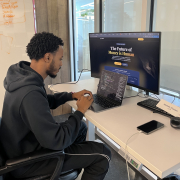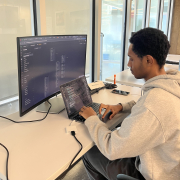CS Majors Revive Communal Saving Through Technology
When University of Maryland computer science students Robel Endashaw (B.S. ’25, computer science) and Abubakr Hussien (B.S. ’26, computer science) began discussing money management, their conversation turned toward a familiar concept rooted in their culture. Growing up in Ethiopian households, both had witnessed the traditional “Ekub,” a community savings circle where members pool money and take turns receiving a lump sum to help families cover emergencies, support education or start businesses.
Now, as second-generation Ethiopians studying in the United States, they are giving that system a modern form. Their startup, Cube, digitizes the Ekub model to create a communal savings platform for communities that value cooperation and shared accountability. The app allows users to contribute to a group fund and take turns receiving payouts, offering an interest-free, debt-free way to access money while fostering trust among members.
“Cube helps people save money together,” Endashaw said. “It’s a simple and automatic way for individuals to contribute to a shared pool and take turns receiving the total amount. The app removes the need to track payments manually or chase down contributions.”
The project is part of UMD’s Mokhtarzada Hatchery Program, which supports student entrepreneurs with funding, mentorship and workspace. For the team, that support has been key to transforming a community-based idea into a technology-driven startup.
Reimagining an Old System
 The idea for Cube originated with Endashaw’s older brother, Fitsum Endashaw (B.S. ’19, computer science), who examined the Ekub system in a paper for an entrepreneurship class. He analyzed how the informal savings model fostered financial cooperation within communities. Inspired by that work, Robel, along with Hussien and Yisac Wanna, set out to modernize the centuries-old tradition and turn it into a digital platform.
The idea for Cube originated with Endashaw’s older brother, Fitsum Endashaw (B.S. ’19, computer science), who examined the Ekub system in a paper for an entrepreneurship class. He analyzed how the informal savings model fostered financial cooperation within communities. Inspired by that work, Robel, along with Hussien and Yisac Wanna, set out to modernize the centuries-old tradition and turn it into a digital platform.
While refining the concept, they reflected on how the Ekub system might translate to the United States, where financial systems often emphasize individual management.
“Back home, everyone knows what an Ekub is,” Hussien said. “Here, people are more individualistic. This could be a way to rebuild community while also helping people save.”
He recalled a story from his mother about an Ethiopian group in the U.S. that used the traditional system but ran into trouble when one member stopped contributing after receiving their payout.
That experience revealed a key challenge. While community-based savings models thrive on trust, they can falter when members default. By digitizing the system, the Cube team hopes to preserve its spirit while adding structure to protect participants from financial loss.
Cultural Practice to Fin Tech
The students also recognized a broader need for accessible savings tools. About 30 percent of U.S. adults say they could not cover three months of expenses, according to 2025 Federal Reserve data, a figure that resonated with their own observations of working-class and immigrant families.
The app’s first version will let users form savings groups, invite members and automate contributions. Members can track progress, view schedules and receive notifications—all features designed to make saving transparent and manageable.
As the platform develops, the team plans to integrate financial literacy tools and credit-building features.
“Many people don’t know how to manage or improve their financial habits,” Endashaw said. “We want Cube not just to help users save, but to help them understand credit and money management.”
Hussien added that future versions could tie participation to credit systems to encourage accountability.
“If someone doesn’t make their contribution, it could affect their credit score,” he said. “That kind of accountability could make the system more reliable while still maintaining community trust.”
Facing Challenges
 Transforming a traditional practice into a digital platform has required extensive research. The team’s most immediate challenge has been finding a compliant way to hold pooled funds without violating U.S. banking regulations.
Transforming a traditional practice into a digital platform has required extensive research. The team’s most immediate challenge has been finding a compliant way to hold pooled funds without violating U.S. banking regulations.
“It’s illegal to store other people’s money in your own account,” Endashaw said. “So we’ve had to research custodial accounts and other financial instruments that meet regulatory standards.”
Navigating those requirements pushed the students to learn beyond their coursework.
“We’ve learned things we never expected,” Endashaw said. “But those challenges are helping us make Cube safer and more sustainable.”
The team is close to releasing its minimum viable product, or MVP, which will be available for testing.
“Once users start interacting with it, we’ll get a clearer picture of what works and what needs adjustment,” Endashaw said.
Hatchery Support
The Mokhtarzada Hatchery, located in the Brendan Iribe Center for Computer Science and Engineering, has been central to Cube’s growth. The program provides funding, workspace and mentorship to student-led ventures in the Department of Computer Science.
“The Hatchery creates an environment where you can focus,” Hussien said. “It’s competitive, but that’s what makes it motivating. You’re surrounded by others who are building their own projects, and you all learn from each other.”
For the Cube team, having a dedicated workspace has strengthened their focus.
“When I’m at the Hatchery, I’m not studying for exams or socializing,” Hussien said. “That space is for Cube. It helps us separate schoolwork from building the startup.”
The mentorship component also adds accountability.
“You don’t want to disappoint the people who believed in your idea enough to fund it,” Hussien said. “It’s pressure, but it’s good pressure.”
Empowerment Through Community
For Endashaw, Cube’s mission is personal.
“I was born and raised in Ethiopia, and I grew up poor,” he said. “I know how much difference financial access can make. Someone might use Cube to fund a small business or cover an emergency. It’s about giving people an option that doesn’t depend on interest or debt.”
By merging cultural familiarity with modern financial tools, the Cube team sees their work as part of a larger story —one in which second-generation immigrants reinterpret their parents’ traditions to meet contemporary needs.
“People like us grew up between two cultures,” Endashaw said. “Our parents taught us about helping each other through community. Now we’re finding a way to make that work in a digital world.”
—Story by Samuel Malede Zewdu, CS Communications
The Department welcomes comments, suggestions and corrections. Send email to editor [-at-] cs [dot] umd [dot] edu.
